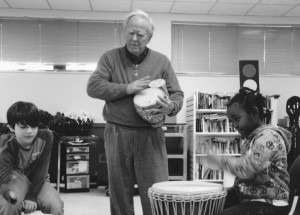
Mark Hinkley
Mark Hinkley joined Community MusicWork’s Board of Directors in 2013, where he serves as treasurer. He also mentors at CMW’s Daily Orchestra Program. After stints in radio, submarines, and urban planning, Mark spent his career in reinsurance. He moved to Charlestown, RI after retiring in 2007. Mark has a particular interest in jazz improvisation.
I’m 71. My interest has always been music. My occupation was reinsurance, nothing to do with music, so it’s nice to be released to do what I want to do. I moved to Rhode Island six years ago, got a suggestion from a friend in response to my question: “What kind of music goes on around here? What’s Providence like?” He suggested I look at the website of CMW. I ended up volunteering for the afterschool program in what capacities I could—I’m not a string player—and that merged into working with the Daily Orchestra as a partial mentor or an improv assist guy, I guess. And I’ve taken an interest in that, which I thought I never would. I was attracted by the whole mission of the place and the quality of the people that I met.
My first exposure to the place was certainly memorable. “Yikes! People are moving bows across fiddles in every room of this school!” Quite an experience. And then to see the humility with which we approach the work was striking. My first impression was that this organization is truly revolutionary and could change the face of music across America and the world. It’s the idealism of the mission that attracted me. Necessarily, I’ve become a bit more realistic in terms of there’s 12 people; it can only go so far. Music education is still something of a one-on-one experience as opposed to basketball or soccer or something like that and therefore it’s labor-intensive. We have limitations in terms of how we expand our influence. But I’m still hopeful we will do that through the ideas that the group generates.
I realize that our job is help redefine the career of a musician, which includes performance, writing, teaching, educating, maybe recording. It’s a holistic approach to, how do we reconfigure what looks like a difficult career as an independent freelancing musician? I’m not sure that I see as clearly the bridge between performing and educating other than the inspiration it gives to the students, their parents, the community. I do see the connection in terms of leadership produced in the students, and the fact that anyone who stays here for 10 years or so almost invariably goes to college. That’s a measurable thing. One of the things I’m always looking for is, how can we measure some of the intangibles associated with performance and education, leadership, social justice–these very difficult areas to quantify? How do we satisfy ourselves let alone funders that we’re doing all we can do?
We need to keep some sense of what urban communities are up against. Where does music work or doesn’t work? How do you constantly try to resolve the tension between a fancy string quartet playing at RISD versus urban needs and people who don’t have access, and the whole problem of classical music becoming more and more remote and refined? How do we make an impact on the community to prove our hope for contributing to social justice? It seems like classical music’s going to self-destruct unless it’s re-inaugurated into the heart of the community somehow.
My hopes always are that CMW will become a national voice. We’ve fulfilled them in a lot of ways with Sebastian being such a good leader and ambassador of the place, but more and more of us should bring it to speaking engagements, playing engagements, relating some of the successes we’ve had, and, in particular, opening people’s eyes to how music education doesn’t have to be in the old-fashioned, conservatory mode. We’re still pretty regional. I’ve become realistic in terms of what we can expect our span of influence to be and I think that is through other institutional places—orchestras, etc.—picking up on what we’re doing, and embracing some of the same philosophies we have.
What motivates me is getting the kids early so that we can make musicians even temporarily out of kids who are 8 and keep them interested till they’re 18. Then there’s a good chance that all of the skills they learned and acts of kindness in trying to be a musician won’t be lost in the cruel world wherever they go after CMW. My hopes are that we become not a louder voice but a clearer voice in music development, and that we keep serving more and more kids in our area and construct a model so that people can say, “We can do that in our area, too.’
I heard “Unfinished Symphony” this morning and thought of CMW. That’s the nature of music. It never actually resolves without some tension to keep you going. We have both here. We keep an open mind and a sort of gentleness towards the tension, knowing that resolution is only temporary.

